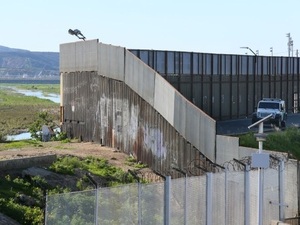Trump's Wall Poses a Dilemma for Hispanic Contractors

Some Hispanic business owners in the United States are offering to help build President Donald Trump's wall to keep out unauthorized immigrants on the Mexican border, despite controversy and their personal misgivings.
"Myself, being an Hispanic makes it tougher," Michael Luera, who runs a construction services firm in Ganado, Texas, told AFP.
His company, Fairfield Logistics, recently expressed interest in working on the border wall project, which has become a lightning rod for public outrage in the debate over Trump's immigration policies.
But it was not an easy choice.
"When this controversy targets all the Mexicans, that really affects me because I know that a lot of them are not bad people and come here to work hard," said Luera, himself a third-generation American of Mexican descent.
- 'You can't ignore it' -
For him as for many others, the chance to win a piece of the massive project, valued at between $8 billion and $40 billion, tips the balance in favor of bidding on the wall.
"Essentially, it's a business decision," said Mario Burgos, head of a New Mexico construction company. "Obviously, when we see an opportunity in our backyard, you can't ignore it."
"I see the wall as kind of good neighbors putting up fences," he said, but added, "I'm always uncomfortable with everything that is anti-immigrant."
While details remain scarce, the project already has drawn the interest of major companies such as the Franco-Swiss cement maker LafargeHolcim, which, like its Mexican rival Cemex, says it is ready to supply materials for "all types of infrastructure projects" in the United States.
In all, nearly 650 businesses of all sizes, including 66 identified as Hispanic-American owned, answered a February 24 "pre-solicitation" call from the Department of Homeland Security.
Customs and Border Protection, a DHS component, had said it would issue a formal request for proposals on Wednesday but delayed this, citing the high level of "industry interest," although it said the notification will be released "soon."
Still, some businesses are clearly more reticent.
Irish building materials firm CRH recently said the project was "not of interest to us or relevant to us."
During the Super Bowl, the Pennsylvania building supply company 84 Lumber aired a television commercial showing workers installing a large door in a border wall to allow a mother and daughter into the United States.
Some small- and medium-sized American business owners, however, say there is no reason for a guilty conscience.
One, who spoke on condition of anonymity, claiming there were "a lot of crazy people out there," said he wanted to "serve my country" by contributing to a project that would block the arrival of unauthorized immigrants.
"I'm a Hispanic but I'm American above all and I want to make sure that everybody obeys the laws," said the fourth-generation American business owner.
"If I have to go to war and kill somebody, I'm just doing my job," said the business owner, a veteran of the wars in Iraq and Afghanistan.
"If the government needs contractors to build this wall, I'm just doing my job."
- 'Aware of the issues' -
Marc Uribe, who works at a California construction company, downplayed the dilemma, veering into irony.
"Oh really? There's a controversy?" asked Uribe. "I didn't know there was anybody unhappy about the wall. Who's that?"
Joe Moreno, who runs contracting business in Arizona with his brother Alfonso, said construction projects are by nature subject to dispute.
"With every project, be it a nuclear plant, a freeway, an airport parking lot, a downtown new development building, there's always a controversy," he said.
"If we had to avoid every controversial project, we would be out of work."
Moreno also said businesses had to bid for a piece of the project because "it pays the bills" and added that his Hispanic heritage would be an advantage in a project that straddled cultures north and south of the border.
"We're well aware of issues that can arise on both sides of the borders. We understand the customs and the languages from both sides of the border."
